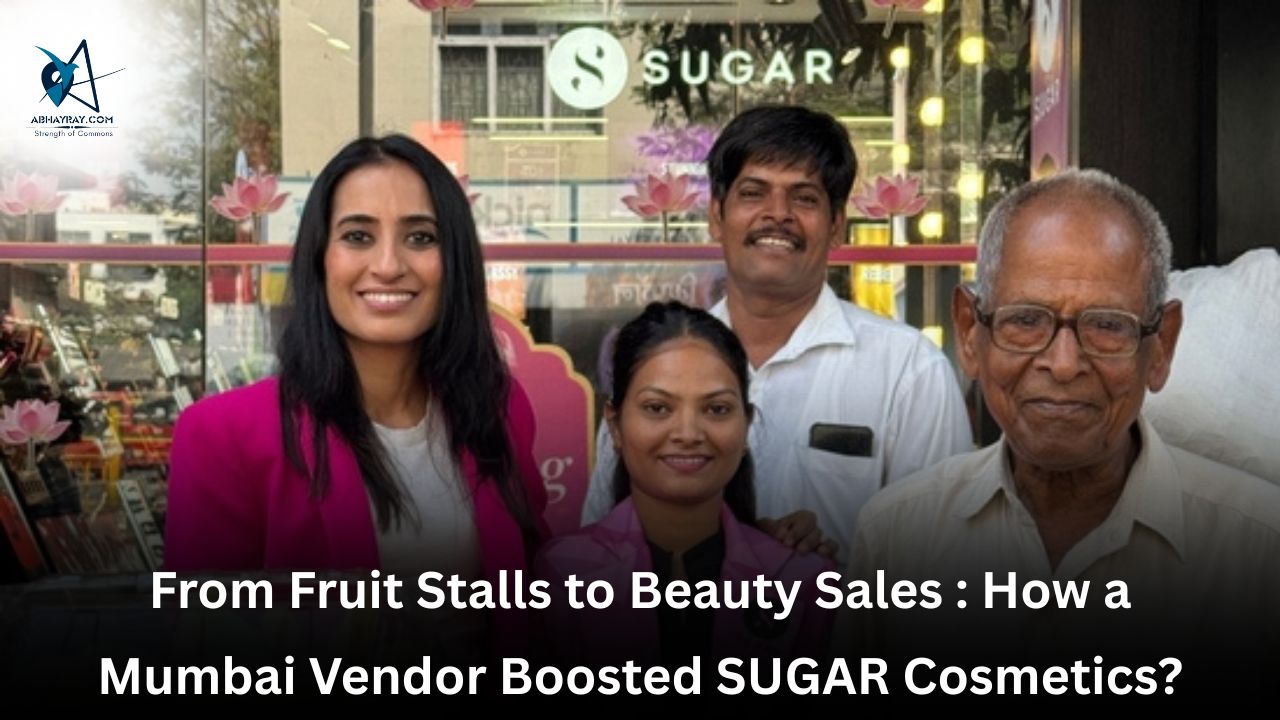Introduction
When Vineeta Singh, Co-founder and CEO of SUGAR Cosmetics, leased a store on Mumbai’s bustling Colaba Causeway, her primary concern was visibility. Street stalls lining the area, she feared, would obscure her brand’s presence. A year later, however, the store emerged as a top performer, with sales soaring beyond expectations.The unexpected catalys?
A decades-old fruit stall run by Suraj and his father, whose grassroots entrepreneurship unlocked a unique customer base: Arab women visiting Mumbai for medical tourism.
Vineeta Singh’s Street-Smart Alliance
In a LinkedIn post detailing the turnaround, Singh shared how initial apprehensions about street vendors transformed into a lesson incollaboration. “Colaba is Colaba every store has a stall in front, and it’s the stalls that have more legacy than the stores,” she wrote, alongside a photo with her team and the fruit vendors. “We decided to give it a try. Last 12 months, we saw sales explode, with bills crossing ₹ 1 lakh frequently. I had to find out why.”
The answer lay in Suraj’s initiative. Over years of interacting with Arabcustomers buying local fruits, he learned basic Arabic and began pitching “Kahaal A1 Hindi” (Indian kajal) to passing women. His efforts directed a steady stream of clients to SUGAR’s store, where they discovered makeup suited to warm undertones and humid climates. “They shop 15 – 20 pieces each, as they don’t expect to return,” Singh explained.
Suraj and his father’s fruit stall became an unlikely gateway for Arab tourists. “Lots of Arab women stop by to buy local fruits (they don’t prefer anything imported). He asks them in Arabic, which he has picked up well, if they want ‘Kahaal A1 Hindi’,” Singh noted. The vendors’ recommendations drove customers to SUGAR, where they purchased kajals, lipsticks, and other products tailored to hot climates. Building Mutual Growth
Recognizing Suraj’s impact, SUGAR’s team forged a symbiotic relationship. During quiet hours, staff invited the vendors for tea, exchanging Arabic phrases related to makeup. Store employee Megha even learned to recommend Indian fruits to Arab shoppers in broken Arabic. “It’s about mutual growth,” Singh noted, emphasizing India’s culture of “street-smart entrepreneurship” where informal networks drive success.
Social Media Applauds ‘Unwritten Magic’ of Indian Retail
The story resonated widely on social media, with LinkedIn users applauding the cross-collaboration. “Nothing works better than genuine human connections,” commented one user. Another highlighted the “unwritten magic of Indian retail,” blending tradition and resourcefulness. Singh’s revelation comes months after she candidly discussed the challenges of co-founding SUGAR with her husband, Kaushik Mukherjee, on a podcast. “Co-founders, be it brothers or family, end up fighting,” she admitted, acknowledging how professional disagreements sometimes spilled into personal life. For Singh, the Colaba experience underscores a broader truth: success often hinges on partnerships beyond formal systems. “India is a land of entrepreneurs,” she wrote, “where people make the biggest difference, even outside corporate frameworks.”
SUGAR Cosmetics’ Viral Growth: A Fruit Vendor’s Impact on Sales
SUGAR Cosmetics, known for its empowering beauty products, experienced a surprising boost in sales thanks to a Mumbai fruit vendor. This unorthodox marketing story began when the vendor, whose wife used SUGAR Cosmetics, decided to sell the brand’s products alongside his fruits. What started as a local initiative soon caught attention on social media, with images of the vendor’s stall featuring both fresh produce and makeup products going viral.
The unexpected blend of fruits and beauty products resonated with people, symbolizing SUGAR’s core message of accessibility and empowerment. When Vineeta Singh, the CEO of SUGAR Cosmetics, recognized the potential, she shared the story on social media, amplifying the brand’s visibility. The story quickly became a symbol of how beauty is for everyone, regardless of their background or profession. This grassroots marketing approach led to a significant increase in brand awareness and sales. The viral story captured the attention of a broad audience, proving that authenticity and relatability can drive powerful, organic growth. The fruit vendor’s influence helped position SUGAR Cosmetics as a brand that connects with everyday people, resulting in lasting success and expanded customer loyalty.
Conclusion
The story of the Mumbai fruit vendor’s unexpected support for SUGAR Cosmetics highlights the power of grassroots marketing and authentic connections. By showcasing the brand alongside fresh produce, the vendor unwittingly became a symbol of SUGAR’s core values of accessibility and empowerment. Vineeta Singh, recognizing the potential, capitalized on this organic endorsement, amplifying the message across social media. The result was a significant boost in brand visibility, customer engagement, and sales. This viral moment proved that sometimes, real, relatable stories resonate more deeply with audiences than traditional advertising, and even the most unconventional marketing efforts can lead to remarkable success.
GMICapitals.com RaysVeda.com GetMyStartup.com LawCanal.com GetMyIndia.com ZinCob.com Angeltors.com

